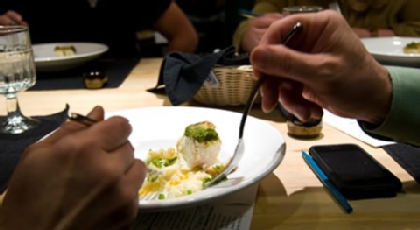The impact of eating
Ethics is not normally the first thing that comes to mind when dishing up your dinner plate, but for Beth Ann Johnson ethics is vital in making dietary choices.

The conference will explore the ethics of eating.
“The idea is we can eat in a sustainable way that’s good for the planet and the people who produce [the food],” Johnson said.
Johnson, a member of Trinity Lutheran’s Hunger Committee, is one of the primary planners for the event “What’s on Our Plate and Why it Matters: Exploring the Ethics of Eating” which takes place at Trinity Lutheran from 5 to 9 p.m. Friday, Oct. 15 and from 8:45 a.m. to 5 p.m. Saturday, Oct. 16 in PLU’s CK Hall in the UC. The symposium will serve to educate PLU students and the community about how their choices impact the environment and the global food production process.
“They’re going to learn more about choices they have, advocacy and how to be a voice for the voiceless,” Johnson said. “This event’s specific focus is to think about what we eat and the impact that has.”
The event is co-sponsored by the PLU Office of Congregation Relations, the PLU Admission Office, Southwestern Washington Synod, Northwest Washington Synod and Thrivent for Lutherans. Allison Ramsey, the office manager for the Southwestern Washington Synod, said this event was inspired by a regional program promoting the ethics of eating.
Ramsey said the event will serve to educate people from all literacy levels, from beginners to participants with extensive knowledge about sustainable food production and development.
Some of the keynote speakers include Managing Director for Bread for the World Jim McDonald and David Creech, Director for Hunger Education for the ELCA.
PLU professors Kevin O’Brien and Brian Naasz, from the religion and chemistry departments, will give workshops related to biodiversity and science.
Another primary keynote speaker is Casson Trenor, a chef and author of the book “Sustainable Sushi: A Guide to Saving the Oceans One Bite at a Time.” Trenor works for Greenpeace, and travels to restaurants around the country ensuring they are practicing sustainable buying and selling of seafood.
“I am really excited to hear him speak,” Ramsey said. “It should be very interesting.”
Johnson said there are so many factors that must be taken into consideration when making choices about eating. She said some of the safety regulations in our country aren’t followed in the countries we purchase food from, and some of those countries are exploiting children as workers.
“Do you have the right to eat a little cheaper and not if someone else starves?” Johnson said. “Just because we don’t see them doesn’t mean we don’t have a level of responsibility to them.”
Johnson hopes that people will attend the event and carry what they learn with them after leaving. She said to help participants do that there will be a series of “Go and Do” workshops wrapping up the event to help people do something with the information they learn.
“We want everyone to carry what they learn into the world,” Johnson said. “It’s all about finding the best next step as a person who comes to this conference. It’s about what you do.”
PLU students can attend for free, but must pay for the meal. For more information, contact the Bishop’s office at 253-535-8301.


